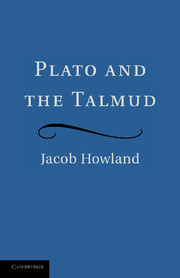Book contents
- Frontmatter
- Contents
- Acknowledgments
- Introduction: Athens and Jerusalem
- 1 Talmudic and Platonic Writing
- 2 Rabbis and Holy Men
- 3 Prophets and Philosophers
- 4 Fathers and Sons
- 5 Words and Deeds
- 6 Gods and Men
- 7 Miracles and Necessity
- Epilogue: Texts and Traditions
- Works Cited
- Index to Biblical and Rabbinic Texts
- General Index
3 - Prophets and Philosophers
Published online by Cambridge University Press: 10 November 2010
- Frontmatter
- Contents
- Acknowledgments
- Introduction: Athens and Jerusalem
- 1 Talmudic and Platonic Writing
- 2 Rabbis and Holy Men
- 3 Prophets and Philosophers
- 4 Fathers and Sons
- 5 Words and Deeds
- 6 Gods and Men
- 7 Miracles and Necessity
- Epilogue: Texts and Traditions
- Works Cited
- Index to Biblical and Rabbinic Texts
- General Index
Summary
Plato's Euthyphro, to which later editors appended the subtitle “On The Holy” (peri hosiou), is one of a sequence of eight dialogues that tell the story of the last days of Socrates. The conversation of the Euthyphro takes place immediately after that of the Theateteus, and shortly before Socrates' public trial in 399 bce; the Apology of Socrates comprises the defense Socrates presents at this trial. Just as the main intellectual drama of Ta'anit 3 arises from the confrontation of Shimon and Ḥoni, that of the Euthyphro consists of an encounter between Socrates and the young man for whom the dialogue is named. Socrates' interrogation of Euthyphro on the subject of piety – a subject about which his interlocutor, a self-proclaimed diviner, insists that he has special knowledge – is a timely and natural outgrowth of the immediate circumstances in which these men meet. Their conversation occurs at an Athenian judicial office (the Portico of the King Archon) to which Euthyphro has come in order to initiate legal action against his father, and to which Socrates has been summoned to respond to the preliminary indictment of three accusers, Anytus, Meletus, and Lycon. These men have charged Socrates with “corrupting the young and not worshiping the gods the city worships, but other, new and strange divinities” (Apology 24b–c). As even the most casual readers of Plato may be expected to know, the archon will allow the indictment to go forward, and, in the days ahead, Socrates will be tried, convicted, and executed.
- Type
- Chapter
- Information
- Plato and the Talmud , pp. 105 - 131Publisher: Cambridge University PressPrint publication year: 2010



